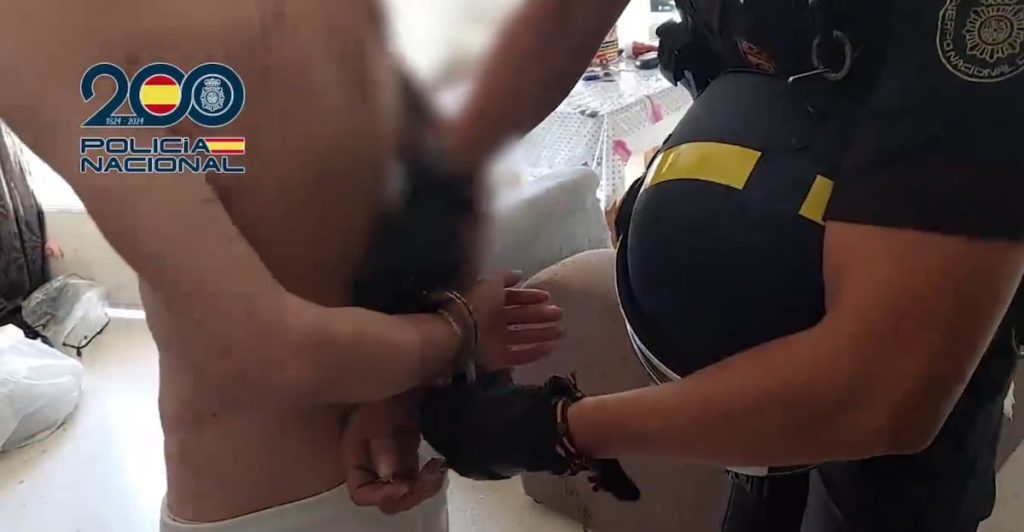The fear and violence were their currency, as well as their best strategy to protect themselves from the accusation of their victims and attract new followers. The National Police has dismantled in Granada the violent organized group of Latino origin coro 717, linked to the Trinitarios group, after an operation in which 11 people were arrested in the Andalusian city and two others in the Netherlands. This group was one of the first to try to establish itself in Andalusia, where it had been for about two years. So far, there had been no activity of this magnitude in the region, according to sources close to the investigation. The detainees are being investigated for “a multitude of violent crimes”, small drug trafficking, and internet scams, such as the “son in trouble” or theft of personal data with misleading messages. They were involved in fights in leisure areas, where they fought with machetes or knife attacks to mark their territory, and also to intimidate potential competitors in the drug trade.
The investigators tracked them down by following the trail of the leader, a 27-year-old who was arrested in the Netherlands, along with his lieutenant, a 32-year-old. In Granada, 11 people between the ages of 20 and 30 were arrested. The suspects have different nationalities, such as Dominican, Spanish, Senegalese, and Colombian. None of them had a regular job, and those who worked did so sporadically and irregularly. “Most of them were responsible for committing internet scams and small-scale drug trafficking,” explain sources close to the investigation. “Scams are the new gold mine for this type of gang,” they add. These types of crimes have less criminal liability than others, such as drug trafficking or violent robberies, and they use the Trinitarios’ name and their characteristic violence to instill fear, making it less likely for their victims to report or testify.
The aesthetic of the group’s members―one of them was completely tattooed, even on the eyelids―was in line with the role each one played. In these types of groups, the leader surrounds himself with a small court that includes a secretary, treasurer, war chief, and enforcer of sanctions and discipline. Below them, there is a base of soldiers with no defined role. In this intermediary scale was the most violent member of the group, who acted as the war chief and hung green plastic ribbons from his balcony, the color of the Trinitarios, as a warning of their dangerousness. The group also displayed their violence on social media, as a form of marketing to attract followers. “Before they marked walls with graffiti, now their territory is social media,” the sources consulted added.
The operation, called Black Mamba, is named after the detainees’ fondness for snakes. The National Police began tracking the leader after his colleagues in the United Kingdom became interested in the Trinitarios’ operations, a group that is at the top among similar gangs in Spain and has Dominican don’t play as its main rival. According to the investigation, they were looking into the leader for his involvement in knife attacks, violent robberies, and small-scale drug trafficking. Pressure led him to leave the country and settle in Granada, where the Provincial Information Brigade of the National Police began to track him. This is one of the first major investigations into the Trinitarios in Andalusia, where there have been some operations in Seville, albeit of lesser magnitude. The group is mainly present in Madrid, Barcelona, or Zaragoza, but they are gradually trying to expand.
The arrests took place on Thursday in Granada and its metropolitan area, while the arrests in the Netherlands were made through European arrest warrants issued by Spain. During the raids, the police seized typical paraphernalia of violent Latin groups, such as necklaces, bandanas, and Trinitarios bracelets, bank cards in other people’s names, and various weapons, such as two saw blades with a handle, a knife, and about 100 hashish pellets. The agents are analyzing the possible international connections of the group. The investigation involved the General Information and Judicial Police Commissioner’s Offices, as well as the Information and Judicial Provincial Brigades in Granada, coordinated by the Criminal Computer Crime Prosecutor’s Office in the same province. The arrested individuals were brought before a judge in Granada’s court number 8 on Saturday, according to a statement from the National Police.














